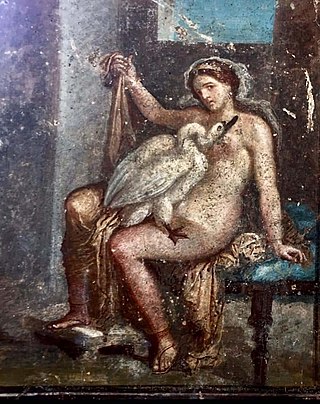Aegle is the name of several different figures in Greek mythology:

In Greek mythology, Phineus or Phineas, was a king of Salmydessus in Thrace and seer, who appears in accounts of the Argonauts' voyage. Some accounts make him a king in Paphlagonia or in Arcadia.
In Greek mythology, Otrera was the founder and first Queen of the Amazons; the consort of Ares and mother of Hippolyta and Penthesilea. She is credited with being the founder of the shrine of Artemis in Ephesus.

In Greek mythology, Phorcys or Phorcus is a primordial sea god, generally cited as the son of Pontus and Gaia (Earth). Classical scholar Karl Kerenyi conflated Phorcys with the similar sea gods Nereus and Proteus. His wife was Ceto, and he is most notable in myth for fathering by Ceto a host of monstrous children. In extant Hellenistic-Roman mosaics, Phorcys was depicted as a fish-tailed merman with crab-claw legs and red, spiky skin.

In Greek mythology, Leda was an Aetolian princess who became a Spartan queen. According to Ovid, she was famed for her beautiful black hair and snowy skin. Her myth gave rise to the popular motif in Renaissance and later art of Leda and the Swan.
Idomeneus of Lampsacus was a friend and disciple of Epicurus.
Hippotes may refer to a number of people from Greek mythology:
Sangarius is a Phrygian river-god of Greek mythology.
Agias or Hagias was an ancient Greek poet, whose name was formerly written Augias through a mistake of the first editor of the Excerpta of Proclus. This misreading was corrected by Friedrich Thiersch, from the Codex Monacensis, which in one passage has "Agias", and in another "Hagias". The name itself does not occur in early Greek writers, unless it be supposed that the "Egias" or "Hegias" (Ἡγίας) in Clement of Alexandria and Pausanias, are only different forms of the same name.
Agroetas was an ancient Greek historian who wrote a work on Scythia (Σκυθικά), from the thirteenth book of which the scholiast on Apollonius of Rhodes quotes, and one on Libya (Λιβυκά), the fourth book of which is quoted by the same scholiast. He is also mentioned by Stephanus of Byzantium. He is one of the authors whose fragments were collected in Felix Jacoby's Die Fragmente der griechischen Historiker.

Ceto is a primordial sea goddess in Greek mythology, the daughter of Pontus and his mother, Gaia. As a mythological figure, she is considered to be one of the most ancient deities, and bore a host of monstrous children fathered by Phorcys, another child of Gaia and Pontus. The small Solar System body 65489 Ceto was named after her, and its satellite after Phorcys.
Theon of Alexandria was a grammarian who taught at Rome in the reigns of the emperors Augustus and Tiberius. He succeeded Areius in this role, and was succeeded by Apion. He was the son of the grammarian Artemidorus of Tarsus and the head of the school at Alexandria.
Andron is the name of a number of different people in classical antiquity:
Xenagoras was a Greek historian from Heraclea Pontica quoted by Dionysius of Halicarnassus, from whom we learn that Xenagoras wrote that Odysseus and Circe had three sons, Rhomos, Anteias, and Ardeas, who founded the three cities which were called by their names. He wrote a work titled Chronicle (Χρόνοι), and another on islands. The 5th century writer Macrobius also refers to the third book of the history of Xenagoras.
Apollonides of Nicaea lived in the time of the Roman emperor Tiberius, to whom he dedicated a commentary on the Silloi of Timon of Phlius.
In Greek mythology, Antianeira may have been mother of the Argonaut Idmon by the god Apollo. The scholiast on Apollonius Rhodius, however, calls Asteria the mother of Idmon.
Argura, called Argissa (Ἄργισσα) in Homer's Iliad, was a town and polis (city-state) in Pelasgiotis in ancient Thessaly, on the Peneus, and near Larissa. The name of the town was also given as Argusa (Ἆργουσσα) in some ancient sources. The distance between this place and Larissa is so small as to explain the remark of the Scholiast on Apollonius of Rhodes, that the Argissa of Homer was the same as Larissa. The editors of the Barrington Atlas of the Greek and Roman World and The Princeton Encyclopedia of Classical Sites identify the site of Agura with a place called Gremnos Magoula, approximately 7 kilometres (4.3 mi) west of Larissa, which has a nearby tumulus.
In Greek mythology, Idaea or Idaia was, by some accounts, the daughter of the Scythian king Dardanus, and the second wife of Phineus, the king of Thrace. Idaea's false accusations against her stepsons were responsible for her husband's misfortunes. She was sent back to Scythia, where she was condemned to death. Other ancient sources give other names for Phineus' second wife, including: Eidothea, sister of Cadmus, and Eurytia.
Aristomenes was an actor of the Attic old comedy, who lived in the 2nd century during the reign of – and was a freed-man of – the Roman emperor Hadrian, who used to call him "Attic Partridge" (Ἀττικοπέρδιξ).
Aristotle of Chalcis in Euboea was a historical writer of ancient Greece. He is mentioned by the writer Harpocration as the author of a work on the islands of Euboea.
![]() This article incorporates text from a publication now in the public domain : Smith, William (1870). "Androetas". In Smith, William (ed.). Dictionary of Greek and Roman Biography and Mythology . Vol. 1. p. 172.
This article incorporates text from a publication now in the public domain : Smith, William (1870). "Androetas". In Smith, William (ed.). Dictionary of Greek and Roman Biography and Mythology . Vol. 1. p. 172.


